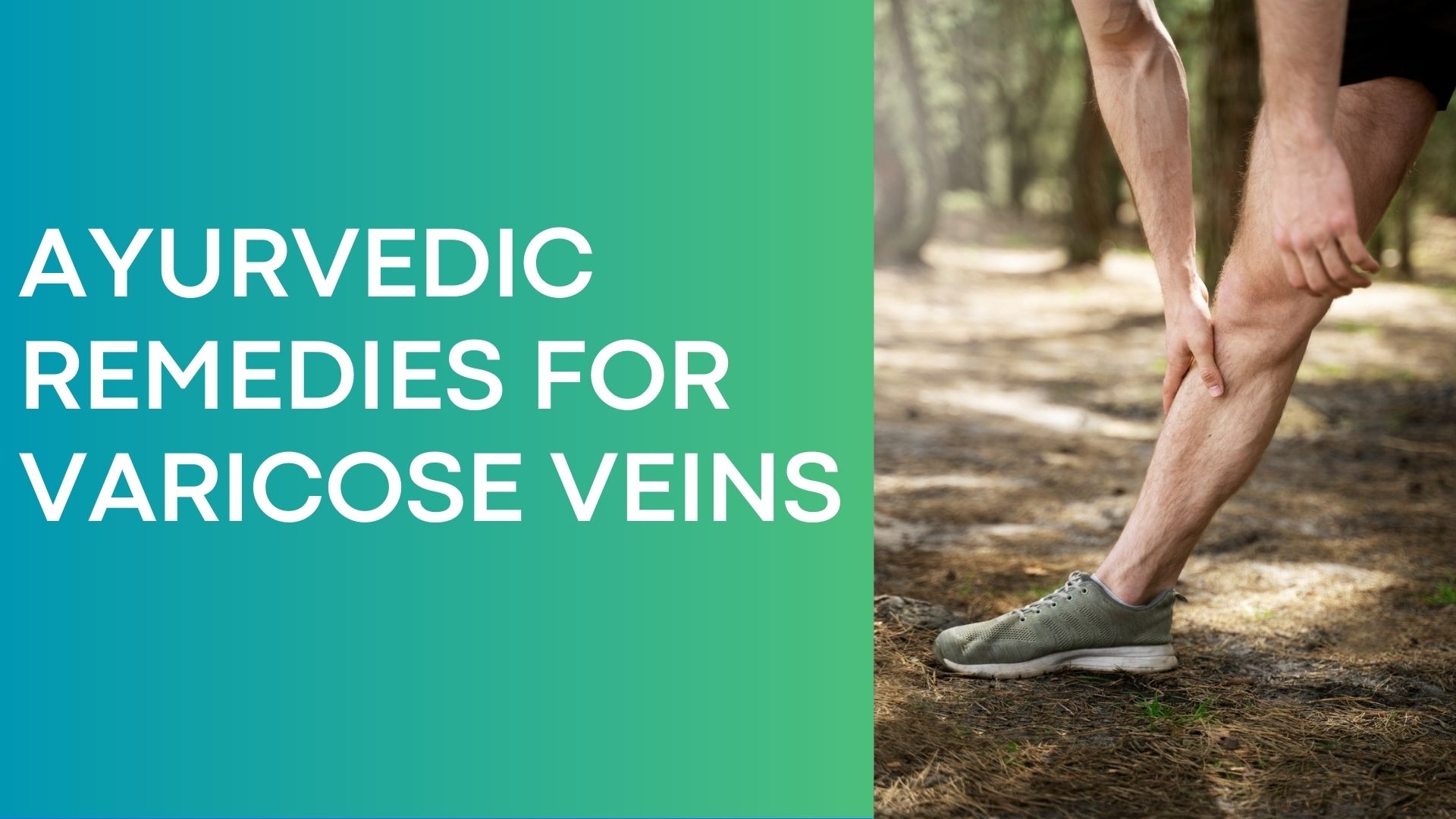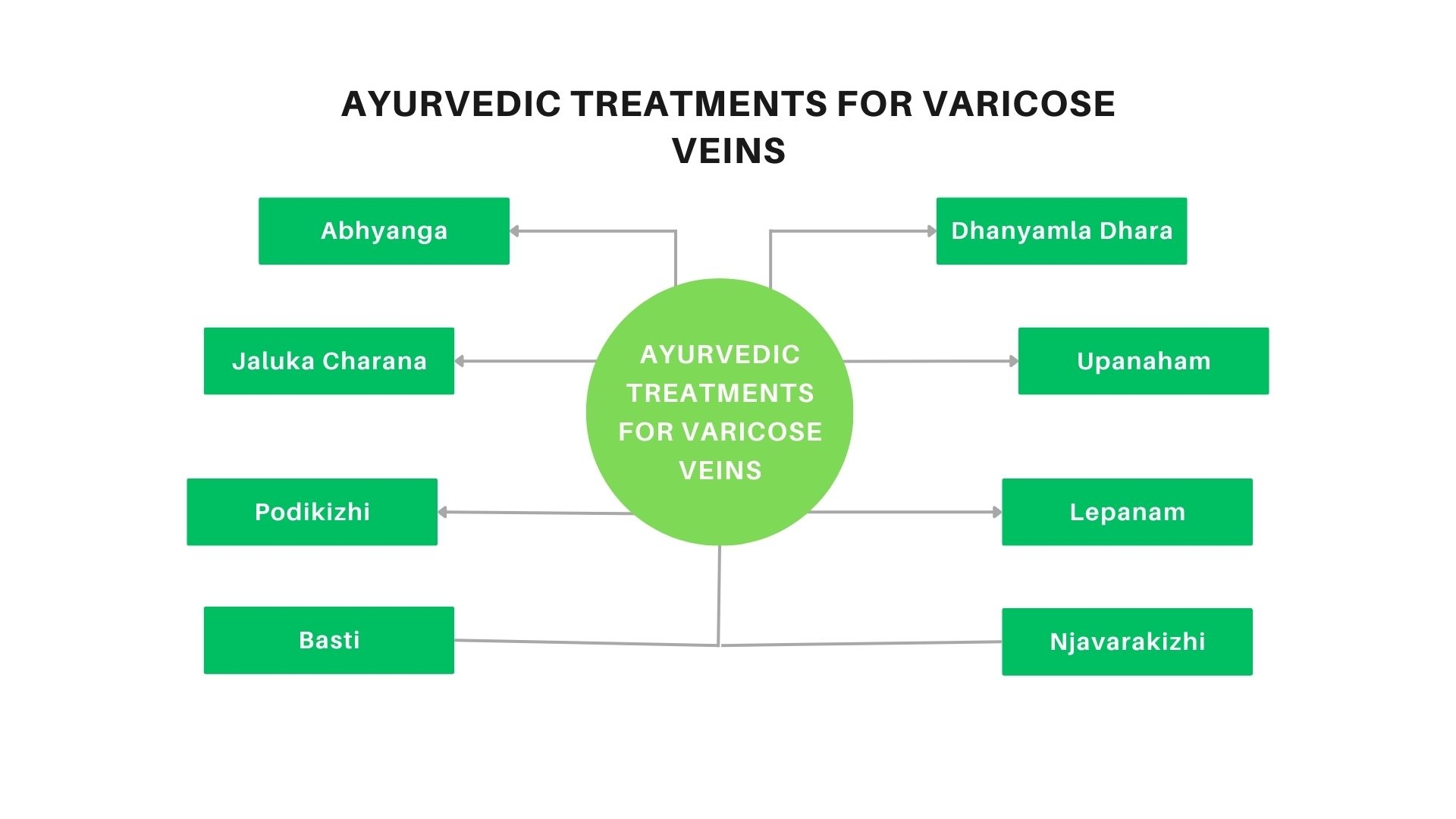Top Ayurvedic Remedies for Varicose Veins

Varicosis is the enlargement or bulging of veins, especially in the legs. They appear in purple or dark blue color and are often painful. Increased blood pressure in the veins is the cause of varicose veins, resulting from prolonged sitting or standing, pregnancy, obesity, or other factors. These swollen veins can be quite uncomfortable, causing a burning or itching sensation. Calf pain, skin discoloration, inflammation, and bleeding are some of the severe symptoms of varicose veins. While mild cases of varicose veins do not require medical attention, severe cases need to be treated either surgically or non-surgically. While modern medical interventions are available, many individuals are turning to Ayurvedic treatment for varicose veins relief due to its holistic approach and minimal side effects. Ayurveda offers effective treatment for varicose veins by targeting the root cause. In this article, we will explore Ayurvedic remedies for varicose veins that aim to promote better vein health and overall well-being.
Varicose Veins and Ayurveda
According to Ayurvedic beliefs, the human body is composed of three doshas: Vata (air), Pitta (fire and water), and Kapha (earth). Imbalances in these doshas lead to diseases and illnesses. The condition of varicose veins is also a result of this imbalance, and Ayurveda aims to restore the balance between all these three. Ayurveda approaches the treatment of varicose veins by focusing on calming the Vata dosha.
Ayurveda, an ancient holistic healing system, offers Ayurvedic remedies for varicose veins that can help alleviate the symptoms of varicose veins. Some of the symptoms of varicose veins are bulged bluish veins on your leg, or ankles, itching around the bulged veins, heaviness in the leg, sore legs or leg pain, swelling in the ankles, feet, or leg, skin discolorations and leg cramps at night.
What are the Ayurvedic Remedies for Varicose Veins?
Ayurveda takes a holistic approach to the treatment of varicose veins. Ayurvedic remedies for varicose veins focus on restoring this balance by improving digestion, detoxification, and promoting healthy blood flow. The treatments focus on calming the vata dosha, restoring dosha balance, and incorporating dietary changes and yoga practices. Here are some of the Ayurvedic treatments for varicose veins.

Abhyanga:
In abhyanga treatment, the body is massaged with medicated oils, especially in the painful areas, to improve blood circulation and alleviate discomfort caused by varicose veins.
Jaluka Charana:
This involves leech therapy, where the blood-thinning properties of leech saliva prevent blood clots or dissolve existing ones. The main goal of this therapy is to enhance blood circulation.
Podikizhi:
A herbal powder is enclosed in a cotton pouch and then pounded on the body for a period of time. This helps reduce inflammation by enhancing blood circulation and lowering blood pressure.
Basti:
Medicinal oil and liquid herbal medicines are introduced into the large intestine through the rectum to reduce inflammation and repair damaged nerves.
Dhanyamla Dhara:
Aimed at relieving pain, improving blood circulation, and reducing inflammation, a medicinal liquid is poured all over the body in this type of treatment.
Upanaham:
For individuals with varicose veins, a thick herbal paste is applied to the affected area, wrapped in cotton cloth, and left overnight to allow the body to absorb the medicines. This treatment is highly effective in alleviating pain and swelling.
Lepanam:
In this treatment, heated herbal paste is applied to the affected area, such as the skin near varicose veins, to reduce inflammation, smooth the skin, and relieve aches. Lepanam also aids in pain management.
Njavarakizhi:
Njavarakizhi involves a cotton pouch containing rice cooked in medicated oil or milk and mixed with herbal extracts. This pouch is dipped in medicated oils and massaged onto specific parts of the body for quick relief from ailments.
Read to know: How effective is Osteoarthritis Treatment in Ayurveda?
Other Remedies in Ayurveda for Treating Varicose Veins :
Gotu Kola:
This herb contains antioxidants in large amounts which can help repair damaged blood vessels. It also improves circulation, heals wounds, and reduces swelling.
Manjistha:
Loaded with anti-inflammatory properties, manjistha helps in reducing swelling, pain, and burning sensation. It helps in balancing the Vata, Pitta, and Kapha doshas, removes impurities from blood, and improves circulation.
Ashwagandha:
This herb can lower blood pressure, reduce swelling, and alleviate leg pains.
Chirabilva:
The tree bark extract of this blood-purifying herb can be made into a paste and applied on the affected area to reduce discoloration. Consuming the extract can also help dissolve blood clots.
Eranda:
Castor oil in this herbal remedy reduces the appearance of dark patches caused by varicose veins and lowers inflammation.
Sariva:
Sariva roots have the ability to reduce pain, remove impurities, enhance blood flow, and improve skin texture. These roots are used to effectively treat varicose veins by applying them in the form of an ointment on the affected areas.
Yoga asanas:
Practicing yoga regularly can alleviate the symptoms of varicose veins. Yoga asanas can be beneficial in reducing inflammation, pain, and improving blood flow. Virasana, Sarvangasana, Pawanmuktasana, Bhujangasana, and Kapotasana are some of the asanas that can help you feel better.
Dietary changes:
People with varicose veins must include foods that can pacify the vata dosha, such as whole grains, fruits rich in vitamin C, and protein-rich foods. Foods that should be avoided are red meat, spicy and salty foods, caffeine, and alcohol. Intake of garlic, ginger, and onion is also beneficial in the treatment of varicose veins.
You may also like to read, 10 Best Foods to Boost Immunity
Preventing Varicose Veins
While it's not possible to completely prevent varicose veins, you can lower the risk of developing them by adopting a healthy and active lifestyle. Here are some tips to consider for preventing or managing varicose veins:
- Maintain a healthy weight to alleviate pressure on your blood vessels.
- Avoid prolonged standing; take regular breaks to stretch and move around.
- Refrain from wearing tight clothing that constricts blood flow, especially around your waist or legs.
- Limit your salt intake to prevent swelling caused by water retention.
- Eliminate unhealthy habits like smoking and excessive alcohol consumption.
- When sitting for extended periods, elevate your legs above your waist to promote blood circulation towards the heart.
- Consider using compression socks to enhance blood flow back to the heart, reduce discomfort, and alleviate pain.
Varicosis is a chronic condition that is quite uncomfortable and painful. With proper Ayurvedic treatments for varicose veins and a healthy lifestyle you can control varicose veins and prevent them from getting worse. Choose Ayur Bethaniya for excellent care and precise Ayurvedic treatments for varicose veins. We ensure the best possible care and enhanced quality of life for patients by utilizing a team of experienced medical professionals and cutting-edge procedures. At Ayur Bethaniya, your health is our top priority.
You may also like to read, How Effective is Ayurvedic Treatment for Neurological Disorders?